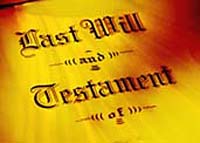 There’s a saying that we don’t know what we don’t know. That’s especially true, when it comes to creating a will and estate planning.
There’s a saying that we don’t know what we don’t know. That’s especially true, when it comes to creating a will and estate planning.
Having a will created to protect your family is not that difficult, if you have the help of a good estate planning lawyer. The amount of angst that can be avoided, not to mention taxes and court costs, should make this an easy decision. Yet two out of five Americans over the age of 45 still don’t have a will, according to a study done by from AARP.
The Reflector’s recent article, “Things people should know about creating wills,” says that writing your wishes down on paper helps avoid unnecessary work and stress when you die. Signing a will allows heirs to act with the decedent’s wishes in mind and also will make certain that assets and possessions go to the right people.
Many people wisely turn to estate planning attorneys to make sure this important task is done correctly and legally. Here are some of the estate planning topics to discuss with your lawyer:
List of Your Assets. Create a list of your assets and determine the ones covered by the will and those that will have to be passed through joint tenancy on a deed or a living trust. For instance, life insurance policies or retirement plan proceeds will be distributed by the beneficiaries you named in each account. Remember that your will can list other assets, like memorabilia, antiques, cars and jewelry.
Naming a Guardian. Parents with minor children should definitely designate the person or persons whom they want to become guardians, if they were to die unexpectantly. They can also use their will to name a person who will be in charge of the finances for the children.
Remembering Your Pets. It’s common for pet owners to use their will to detail guardianship for their pets and to leave money or property to defray the cost of their care. However, remember that pets don’t have the legal capacity to own property, so don’t leave money directly to pets in a will. A pet trust is legal in most states and is the best way to leave money and name a caretaker for your pets.
Stating Your Funeral Instructions. Settling probate won’t occur until after the funeral. As a result, any funeral wishes in a will frequently aren’t read until after the fact.
Designate an Executor. This is a trusted individual who will execute the terms of the will. He or she should be willing to serve and be capable of executing the will.
What happens if you die without a will? Your assets are distributed according to the laws of your state. A court-appointed administrator and not a family member transfers assets and property. Your long-lost brother, who you haven’t spoken with in decades, could inherit everything. Or a distant cousin, if there are no closer heirs, could end up owning your home.
That’s not what most people would want. The solution is simple. Contact an experienced estate planning attorney, make an appointment and have an estate plan completed. You’ll feel better, and your family will appreciate it long after you have passed.
Reference: The Reflector (July 15, 2019) “Things people should know about creating wills”
